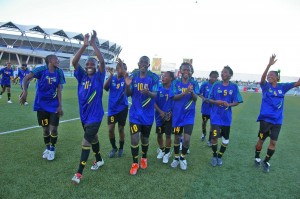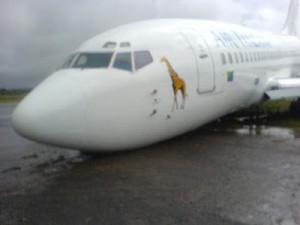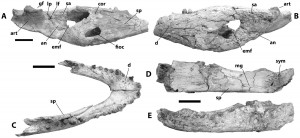There have been two items of good news in the anti-corruption campaign during recent weeks.
Money recovered
Minister of Finance Mustafa Mkulo has announced that the government has recovered Shs 72 billion ($53 million) from the Shs 133 billion (98.5 billion) of the Bank of Tanzania’s External Payments Arrears account which was misappropriated.
Air Traffic Control System – RADAR
In the very long running Air Traffic Control System (Radar) case, (see earlier issues of TA) dramatic news came from the UK’s Senior Fraud Office (SFO) in January when Britain’s BAE Systems finally accepted responsibility in several corruption cases around the world including the one in Tanzania. It agreed to pay penalties in the US and the UK totaling several hundred million dollars to settle the cases against it.
Under the deal, BAE will pay $400m (£255m) in the US and $47m (£30m) in the UK, the latter being a penalty for over-pricing the cost of the air traffic control system it sold to Tanzania several years ago. Leading up to the deal, the SFO had named Minister Andrew Chenge, businessmen Sailesh Vithlani and Tanil Somaiya, and former Governor of the Central Bank of Tanzania, Dr Idris Rashid as the key suspects. SFO investigators established that BAE Systems had secretly paid a $12m commission into the Swiss bank account of Sailesh Vithlani who was alleged to be the ‘middleman’.
According to details from the SFO’s investigation, the actual price of the military radar system sold to Tanzania was far less than the money paid by Tanzania which had to borrow from Barclays Bank to help it to pay. Under the new deal between the SFO and BAE Systems Tanzania will get a refund of some $28 million.
Legal issues
Before Tanzania can receive the money however, a number of legal issues have to be dealt with. According to ‘Africa Confidential’, British lobbyists ‘Corner House’ obtained an injunction on March 3 to freeze BAE’s plea-bargain deal with the SFO pending a decision on whether there should be a full judicial review. Africa Confidential reported that, if the deal were blocked, the SFO would probably proceed with a corruption case against BAE on some of its other contracts, followed by a prosecution over its contract for the air traffic control system in Tanzania.
The SFO had earlier indicated that some of the cash would become ‘an ex gratia payment for the benefit of the people of Tanzania’.
However, BAE was insisting that it would not pay the money to the government but that it would be given instead to local charities dealing with humanitarian aid in Tanzania. In Tanzania, Minister for Foreign Affairs Bernard Membe insisted that the compensation should be paid to the government.
Some legal are said to believe that BAE may be anxious to avoid any legal implications that might arise if Tanzania finally chose to arrest and prosecute the key suspects. By paying the billions to charity organisations, it would appear that the donation would be part of the company’s ‘corporate social responsibility’ funding.
Suzan Hawley of ‘Corruption Watch’, a UK based anti-corruption watchdog was quoted as saying that “This is a trick chosen by BAE to avoid being implicated directly by a third party, but it’s an old style that won’t get them off the hook.”
‘Corruption Watch has filed an application at a UK court seeking a review of the SFO and BAE settlement.
Director of Tanzania’s Prevention of Corruption Bureau Edward Hoseah has written to the SFO welcoming the promised payment and suggesting procedures to ensure that the repatriation of the funds would be done transparently.
It is understood that BAE’s plea-bargain deal in Britain would has no automatic effect on the Tanzanian government’s own investigations. These are continuing – (from the Guardian on Sunday, Nipashe various British and Tanzanian newspapers and other sources – Editor)
“We need a reaction” US Ambassador
In early March US ambassador to Tanzania Alfonso Lenhardt began to throw his weight behind the crusade against corruption when he challenged the government to step it up by ensuring that suspected or proven corrupt leaders are prosecuted. “For the monster of grand corruption to be eliminated”, he said “strong deterrent signals are required, including jail sentences for leaders found guilty along with confiscation of their ill-gotten wealth. Indeed, the government should not continue to beat around the bush on matters that are before the eyes of the public; we need a reaction and a system that will throw corrupt senior civil servants and politicians where they belong – behind bars.” The ambassador went on to say that it was heartening to note that there were already encouraging steps being taken to tackle corruption, “but more needs to be done” he said. “The vast majority of Tanzanians did not like to see leaders implicated in serious graft scandals being left scot-free, untouchable and unaccountable….studies conducted across the world have shown that bribery, fraud, favouritism, and cronyism all breed and deepen poverty in the society. That is why countries like Tanzania remained poor as their otherwise rich development resources were daily depleted through such corrupt practices
The Richmond Case
Investigations into the complicated Richmond electricity generation case (see earlier issues of TA) are continuing. According to Tanzania Daima, the company which took over from Richmond after it withdrew – Dowans – is understood to be indebted to the tune of $ 2.4 million for breach of the contract it entered into with the Ministry of Energy and Minerals and which it had inherited from Richmond. Dowans apparently wanted to sell the generating plant it had constructed in Dar es Salaam but it was stopped by the court. The government is now demanding a penalty for failing to supply Tanzania with power.
The political implications
As indicate above, the Richmond scandal is now having repercussions on the political scene. The investigative journal ‘This Day’ has been looking into the matter. Extracts: ‘Whatever happens in the upcoming months of election year 2010, history will always show that prior to the Richmond affair, National Assembly Speaker Samuel Sitta and former Prime Minister Edward Lowassa were close political allies and both were key members of the powerful campaign machinery that delivered a landslide victory for President Jakaya Kikwete in 2005…it is because of this, that the new stand-off between the two (see above) is proving so damaging to the ruling CCM party’s aspirations to stay united…. Following the 2005 general election, Lowassa and other members of the pro-Kikwete campaign lobby better known as Mtandao (the network) backed Sitta’s candidature for the position of Speaker and, thanks in large part to active campaigning by senior Mtandao members, Sitta eventually won the speaker’s position by defeating the incumbent speaker, Pius Msekwa, in a tough contest. In December 2005 Lowassa was endorsed by parliament as Prime Minister….But then came the Richmond scandal. By 2008, Lowassa and Sitta were at loggerheads over the manner in which parliament – with Sitta’s backing – was handling the Richmond case as it grew in seriousness…. It was Lowassa who had supervised the process that led to the awarding of the dubious government power generation contract Richmond against expert opinion. TANESCO had reluctantly signed the contract with Richmond at night at the headquarters of the Ministry of Energy and Minerals….Richmond did not perform and a parliamentary team delivered a damning report on the deal which implicated Lowassa and others who promptly tendered their resignations.
The ‘Mramba’ case
The case of former Finance Minister Basil Mramba, and his counterpart Daniel Yona (following three years of investigations by the Prevention and Combating of Corruption Bureau and the police into the suspicious hiring of Alex Stewart Corporation to audit gold production in Tanzania) has been adjourned again because the magistrate was away. The hearing of the case started in November 2009. Four prosecution witnesses have so far testified.




